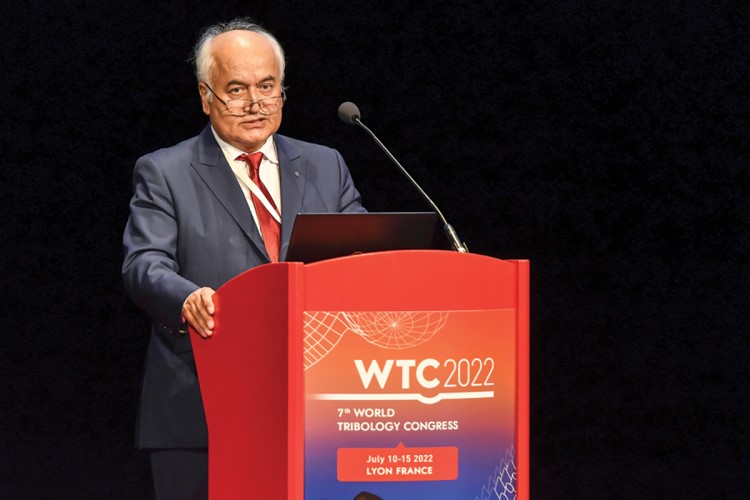Prof. Dr. Ali Erdemir, a world-renowned Turkish scientist who has conducted groundbreaking studies in the fields of materials science, surface engineering, and tribology, gave an interview to Lubricant World magazine.
Emphasizing that contrary to popular beliefs that the need for lubricants will decrease with the transition to electric vehicles, new types of lubricants will be needed, Prof. Dr. Erdemir also provided valuable information about the technology of producing lubricants from plastic waste. This new invention, which saves the economy millions of tons of plastic, heralds a more livable planet for future generations.
You are well known for your distinguished contributions to the science and technology of tribology. You hold numerous R&D awards for the inventions developed using nanotechnology such as diamond-like carbon films and boric acid lubricant. What is the main significance of your inventions and their impact on the lubricant industry?
These inventions are all about making surfaces subject to wear and friction more slippery and durable, and many of them have been industrialized. Given that nearly one-fourth of all energy produced in the world is spent on overcoming wear and friction, and that the vast majority of this energy is produced from fossilbased fuels, we can conclude that all of this work is environmentally friendly. Our efforts are critical for a greener and more sustainable future.
Energy efficiency, sustainability, and e-mobility are the world’s top priorities. What engineering innovations your work on these issues will bring forward?
E-mobility has become extremely important nowadays. Wear and friction are expected to be much higher in electrically powered vehicles because the surfaces will also be subjected to electric current discharge. As a result, the surfaces will experience excessive corrosion and oxidation. Therefore, the materials and lubricants used in vehicles must be revised and adapted to electric vehicles. The importance of surface engineering becomes much more prominent in such practices.
You are a highly patented scientist in addition to being the recipient of numerous awards. What is the number and content of your patent applications?
I currently hold 33 patents. Of course, these patents are the result of a collaborative effort of many colleagues. Everyone has made significant contributions. All my patents contain critical findings; otherwise, you would not have received the patent. Almost all of the patents concern lubrication and surface technologies. Our most recent patent covers the production of lubricants from waste plastics. As you are aware, plastic pollution has recently begun to have disastrous effects on our environment. Together with my colleagues, we have discovered that it can be turned into a product with a performance at least as high as that of conventional mineral and synthetic lubricants. This discovery is critical for preventing environmental pollution.
This patent you mentioned is extremely promising for the lubricant industry. Could you please give some further details?
We conducted the study of this patent with a project team led by Iowa State University. The project team includes Argonne National Laboratory, Chevron Philips Chemical Company, Chemstation Inc, and American Packaging Corp., the City of Ames Resource Recovery Facility and Hy-Vee, alongside Texas A&M University. Our project, which was recently published in the journal ChemSusChem, was one of 12 projects funded by the U.S. Department of Energy’s Plastics Innovation Challenge on fighting plastic waste.
We aim to support the circular economy by upcycling plastic waste into raw material for lubricants once the project is implemented. This project will provide economic benefits while also eradicating the terrible environmental damage caused by plastic waste. These responsibly recycled materials will turn into high-performance lubricants saving the planet from hundreds of millions of tons of plastic waste, and will make a significant contribution to our goal of a more livable world and a greener future.
Will lubricants produced from plastic waste be used in the automotive or industrial sectors?
It could be used both in automotive and industrial applications. If proven commercially viable, we expect our research findings to turn into a wide range of lubricants – including engine oils and a wide range of industrial lubricants – that could help reduce energy consumption and the carbon footprint of future transportation and other industrial systems.
For many years, you have been conducting R&D studies in collaboration with universities and industry. Do you believe Türkiye’s interest and budget for R&D are sufficient in comparison to the rest of the world?
I’d like to believe that sufficient resources are dedicated to R&D in Türkiye. R&D budgets in Europe and the United States are quite large. I cannot track R&D expenditures in Türkiye from abroad, but in advanced technology countries, R&D accounts for 3 to 4% of GNP. A comparison may be made accordingly.
How do you expect your research to be affecting the industry, the lubricant sector and the environment in the near future?
The focus of our studies is to contribute as much as possible to global sustainability by developing green technologies and more environmentally friendly inventions, to provide environments in which posterity can breathe, live, and laugh freely. Unfortunately, the current situation does not seem promising. We need to be much more aware, otherwise, natural disasters, drought, hunger, and pandemics will render our planet uninhabitable. We all have an important role to play in overcoming these negativities.
Prof. Dr. Ali Erdemir
Prof. Dr. Ali Erdemir was born in 1954 in Osmaniye, Türkiye. In 1977, he graduated from Istanbul Technical University, Department of Metallurgy. Continuing his academic career in the USA, Erdemir gained a reputable place in the scientific world with his laboratory studies and research and was awarded many international prizes. Prof. Erdemir has received numerous awards and honors, including six R&D 100 Awards and 33 U.S. patents. Working in the Department of Mechanical Engineering at Texas A&M University, Prof. Erdemir, is currently the President of the International Tribology Council.

















